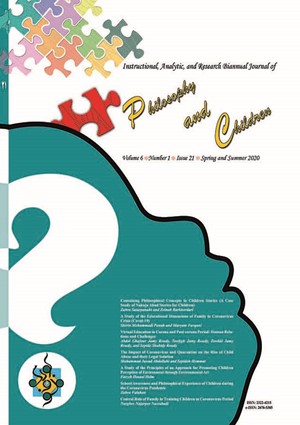Central Role of Family in Training Children in Coronavirus Period
Subject Areas : “Education and training” and “philosophy and children”
1 -
Keywords: family children training crises Corona ,
Abstract :
In recent months the world underwent a great changes the comprehension and adaptation of which would be challenging and difficult for children, because they are not able to comprehend the events pertaining to their life and try to protect themselves due to their dependence on their parents in different fields. If children are protected by their parents and friends, then they may be spared from any threat. Thanks to their control over their children parents by their proper behavior can assure continuously their children that coronavirus is curable and they should not be very much worry about this disease. Moreover, they can also assure their children that they can take certain effective and positive measures in crises time to save themselves and others. By protecting children, they can achieve their long term objectives and prevent them from any upcoming losses since they are the social assets and moving motor of growth and development of society.
بهزادیپور، ساره (1399) رفتار با کودکان در دوران شیوع کرونا، سایت مرکز خدمات تخصصی درمان در منزل 0 دم). 20 اکتبر 2020؛ www.64064.ir.
پروسنان، امیر (1399) کرونا در کمین کودکان، سایت ایرنا، کد خبر 84258467؛ www.irna.ir/news.
جعفری، رضا (1399) کرونا و لزوم مراقبت روانی ـ اجتماعی از کودکان و نوجوانان، خبر انلاین کد خبر 235237؛ .WWW. Khabaronline.ir
چوبداری، عسگر؛ فولادی، فاطمه؛ نیکجو، فاطمه (1399) «پیامدهای روانشناختی کرونا ویروس جدید (كويد 19) در کودکان مطالعه نظاممند»، فصلنامه روانشناسی تربیتی دانشگاه طباطبائی، سال 16 شمارة 56.
سخاوتپور، زهره (1399) «تمام علائم سرماخوردگی میتوانند علائم کرونا در کودکان باشند»، کودک پرس، خبر پزشکی و سلامت 221725؛ www.koodakpress.ir .
شبکه بهداشت درمان شهریار (1399) کودک در همه گیری ویروس کروناhttps://shahriar.iums.ac.ir > files (PDF). Altai, E. R. P., & Linares, M. B. M. (2016). Universal violence and child maltreatment prevention programs for parents: A systematic review. Psychosocial Intervention, 25(1), 27-38.
Brooks, SK., Webster, RK., Smith, LE., Woodland, L., Wessel S., Greenberg, N., Rubin GJ. (2020). The psychological impact of quarantine and how to reduce it: rapid review of the evidence. The Lancet.
Dalton, L., Rapa, E., & Stein, A. (2020). Protecting the psychological health of children through effective communication about COVID-19. The Lancet Child & Adolescent Health, 4(5), 346-347.
Fegert, J. M., Vitello , B., Plener .P. L., & Clemens, V. (2020). Challenges and burden of the Coronavirus 2019 (COVID -19) pandemic for child and adolescent mental health: a narrative review to highlight clinical and research needs in the acute phase and the long return to normality. Child and adolescent psychiatry and mental health, 14, 1-11.
Ghosh, R., Dubey, M. J., Chatterjee, S., & Dubey, S. (2020). Impact of COVID-19 on children: Special focus on psychosocial aspect. Education, 31, 34-42.
Gong, B., Zhang, S., Yuan, L., & Chen, K. Z. (2020). A balance act: minimizing economic loss while controlling novel coronavirus pneumonia. Journal of Chinese Governance, 4, 1-20.
Holing, H., Schlack, R., Peterman, F., Ravens Sheerer, U., Mau, .E, & KiGGsstudy Group (2019) Psychopathological p problems and psychosocial impairment in children and time trends at tow measurement points. Bundesgeundheitsblatt .57(7) ,807-812
Jiao M, Safary S, Jaded M, Jamal S. (2020). Comparing social support and social anxiety between mothers of children with special needs and mothers of normal children (Persian). Knowledge & Research in Applied Psychology. 2015; 16(2):43-52. http://jsr-p.khuisf.ac.ir/article_533965_en.htm
Lee, J. (2020). Mental health effects of school closures during COVID19. The Lancet Child & Adolescent Health, 4(6), 421.
Liu, J. J., Bao, Y., Huang, X., Shi, J., & Lu, L. (2020). Mental health considerations for children quarantined because of COVID-19. The Lancet Child & Adolescent Health, 4(5), 347-349.
Maynard, M. s., P Elman, C. M., & Kirkpatrick, S.I., (2019). Food insecurity andpereived anxiety among adolescents : An analysis of data from the 2009-2010 N national Health and Nutrition Examination Survey (NHANES) Journal of Hunger & Environmental Nutrition, 14 (3) ,339- 351.
McGrath, J. (2020). ADHD and Covid-19: Current roadblocks and future opportunities. Irish Journal of Psychological Medicine, 1-22.
Narzisi, A. (2020). Handle the autism spectrum condition during Coronavirus (COVID-19) stay at home period: Ten tips for helping parents and caregivers of young children. Brain Sciences, 10, 207-211.
Park, I., Oh, S. M., Lee, K. H., Kim, S., Jeon, J. E., Lee, H. Y., & Lee, Y. J. (2020). The moderating effect of sleep disturbance on the association of stress with impulsivity and depressed mood. Psychiatry Investigation, 17 (3), 243-433.
Roccella, M. (2020). Children and coronavirus infection (Covid-19): what to tell children to avoid post-traumatic stress disorder (PTSD). The Open Pediatric Medicine Journal, 10 (1). 14-19.
Sprang G, Silman M. Posttraumatic stress disorder in parents and youth after health-related disasters. Disaster medicine and public health preparedness. 2013;7(1):105-10
Wang, G., Zhang, Y., Zhao, J., Zhang, J., & Jiang, F. (2020). Mitigate the effects of home confinement on children during the COVID-19 outbreak. The Lancet, 395, 945-947.
World Health Organization (2020). COVID-19 situation. 2020. Accessed: 7 Jun 2020.
Zhao, N., & Huang, Y (2020) Generalized anxiety disorder, depressive symptoms and sleep quality during COVID-19 epidemic in china. a web – based cross- sectional survey Psychiatry research. 45,15-22.


